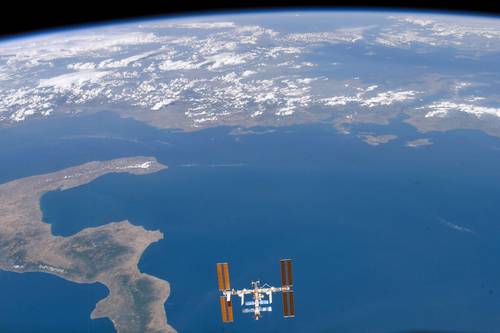The plant was captured on August 19, 2007, against the backdrop of the Earth’s horizon and the blackness of space, by the shuttle Endeavour.Afp Foto Photo
Moscow. Russia will withdraw from the International Space Station (ISS) after 2024 and will focus on building its own orbital base, the new head of that country’s space agency announced yesterday.
Yuri Borisov, appointed head of Roscosmos earlier this month, made the announcement during a meeting with Russian President Vladimir Putin.
He stated that Russia will fulfill its obligations to the other ISS partners before withdrawing from the project. The decision to leave the station after 2024 is made
Borisov assured.
However, the United States did not receive official notice
of Russia about its plans to abandon the plant, according to an official of the National Aeronautics and Space Administration of the United States (NASA).
Russian space officials had previously declared Moscow’s intention to withdraw from the space post after 2024, and Borisov confirmed it amid growing tensions between Russia and the West over Russia’s incursion into Ukraine.
As a model of international cooperation that brings together European countries, Japan, the United States and Russia, the ISS began to be assembled in 1998 and, although its retirement was expected in 2024, NASA indicated that its life could last until 2030.
At the meeting, reported by the Kremlin press service, Borisov confirmed to the president that the main priority of Roscosmos at present is to provide the Russian economy with essential space services. The head of Roscosmos also indicated that the agency’s goal from now on in terms of manned space exploration will be the creation of a Russian orbital service station (ROSS, for its acronym in Russian).
Vladimir Putin issued a decree on July 15 by which he removed Dmitri Rogozin as head of Roscosmos. Borisov, 65, was deputy prime minister in charge of the Russian military-industrial complex, which also includes space.
Until now, space exploration was one of the few areas where cooperation between Russia and the United States and its allies had not foundered on tensions over Ukraine and other disputes.
Despite disagreements between their governments, NASA and Roscosmos agreed earlier this month that Western astronauts will continue to travel on Russian rockets to the space station and for cosmonauts to travel on SpaceX ships starting this fall.
The agreement ensures that the station will always have at least one American and one Russian on board so that both sides of the orbital outpost will function smoothly, according to NASA and Russian officials.
The exchange had been a long time in the making and went through despite friction over Ukraine, signaling apparent space cooperation between Russia and the United States.
The US agency planned that after withdrawing the ISS – a symbol of the unity of the post cold war– would work with commercial stations, said Robyn Gatens, NASA director in charge of the plant, and suggested that Russia could be thinking about its transition.
Asked if she wanted the end of relations between the United States and Russia in space matters, she replied: “No, not at all.
They have been good partners, as they all are, and we want to stay together as a partnership to continue operating the space station throughout this decade.
he claimed.
